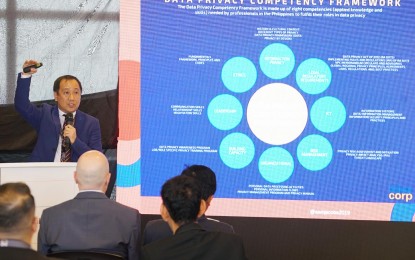
EXECUTIVE FORUM ON DATA PRIVACY. Sam Jacoba, founding president of the National Association of Data Protection Officers of the Philippines (NADPOP), discusses the components of data privacy competency framework and shares his expertise on data protection, during the Executive Forum on Data Privacy and Protection at the UnionBank Plaza in Ortigas Center, Pasig City on Thursday (Oct. 3, 2019). The forum, organized by NAPDOP and UnionBank, highlights the importance of data protection in the financial sector. (PNA photo by Ben Briones)
MANILA – The need to secure data of customers and companies has paved the way for a new industry that now provides thousands of jobs around the globe.
This was disclosed by Sam Jacoba, National Association of Data Protection Officers of the Philippines (NADPOP) founding president, in his talk during the data privacy and security forum dubbed SELYADO 2019 at the UnionBank Plaza in Ortigas Center, Pasig City on Thursday.
Jacoba explained that, for one, Philippines’ Data Privacy Act of 2012 not only assured customer safety but also increased the need to professionally protect data that a company holds.
“This law has also made us take our data more seriously and use it ethically, while pushing businesses to transform and innovate,” he said during the forum jointly spearheaded by Union Bank of the Philippines (UnionBank) and NADPOP’s Alliance and Partnership group.
In an interview by journalists, Jacoba explained that when the European Union (EU) approved the General Data Protection Regulation (GDPR) in 2016 it was estimated that the 28-member states need about 40,000 data protection officers (DPOs).
In Singapore, the strengthened data protection regulation required about 10,000 DPOs, he said.
In the Philippines, taking into consideration the number of registered companies that manage personal information, Jacoba said NADPOP sees shortage of world-class DPOs along with professionals who are into data analytics and other data-related careers.
“So if you’re a Filipino looking for a career shift or if you are a fresh graduate looking for something to specialize on being a data protection officer or data privacy professional is going to be one of the best way for you to improve of yourself,” he said.
Among the companies that strengthened their data privacy policies includes those in the business process outsourcing (BPO), health care, and financial services sectors.
Despite of this some companies remain vulnerable to breaches, which, he said, cannot be attributed mainly to complacency but because of focus on other aspects of the business.
“They may not be complacent but they were busy with other things,” he said, citing that this is where regulators come in.
Jacoba also raised the need for the various sectors to come up with their data privacy code of ethics as soon as possible instead of experiencing a bad incident first before coming up with one.
Relatively, he considers government measures to increase companies’ compliance to the Data Privacy Act as enough.
“I believe so. In my opinion the NPC (National Privacy Commission) is one of the best performing government agencies there are…and with the resources that have been given them I think they’ve deemed it up,” he said, citing the free toolkit NPC has distributed to data privacy officers (DPOs) and the annual DPO gatherings, which, he said, is now on its second year. (PNA)
